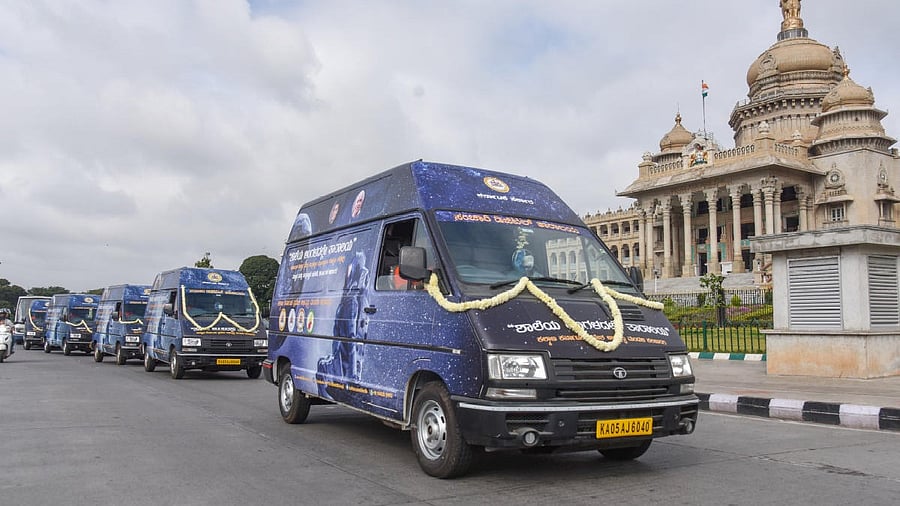
Mobile Digital Planetarium, learning center additional vans by Science and Technology department for Kalayana Karnataka schools are launch in front of Vidhana Soudha, Bengaluru.
Credit: DH Photo/S K Dinesh
The ‘mobile planetarium’ project, which had gained popularity as specially-designed vehicles took astronomy to the doorsteps of nearly 18 lakh schoolchildren in the state, has been put on hold citing the need to evaluate its impact.
“The project was stopped in February this year,” a source directly aware of this told. “In August this year, the project ran for 10 days before running into obstacles. Finally, in September, the project was stopped again.”
It is said that the project was stopped after a top official at the Karnataka Science and Technology Promotion Society (KSTePS) wanted to review the functioning of ‘mobile planetariums’ and study the impact they have had.
The project was first launched in 2017 when the government deployed five mobile planetariums to provide an immersive, digital experience of space for students at government-run high schools and pre-university colleges. Two mobile planetariums were given to the Belagavi division and one each in Bengaluru, Mysuru and Kalaburagi.
With inflatable domes, the mobile planetariums recreate the opto-mechanical projection that the Jawaharlal Nehru Planetarium uses in its popular Sky Theatre where visuals of planets in the Solar System are projected.
Known as Taare Zameen Par, the mobile planetariums are designed by edtech startup Varnaaz Technologies.
By 2020, there were 11 mobile planetariums, each reaching 200 kids per day on average. The then chief minister B S Yediyurappa had announced expansion of the project, which he described as “a success in educating students of rural schools regarding the wonders of astronomy.”
While Covid-19 halted the project for two years, it resumed in August 2022 and was to run for three years. “But a year later, the KSTePS official decided to give only 3-month extensions. Questions were raised on the project’s scope when schools are closed for holidays even as the tender document said public programmes should be organised. The Karnataka Monitoring and Evaluation Authority was asked to conduct an impact study, but they sat on it,” the source quoted earlier said.
When contacted, Science & Technology Minister N S Boseraju said his department would arrive at a conclusion soon.
“The project was introduced when I was chairperson of the Kalyana Karnataka Development Board,” Boseraju said.
“A tender was awarded by the previous government. Each vehicle costs Rs 30 lakh. Upkeep of vehicles and machinery inside them is important. We want to ensure that the company running the project does it well. Also, we want to get an evaluation done based on feedback from schools where mobile planetariums reached. This has been delayed, and I’m getting it expedited,” he said.
